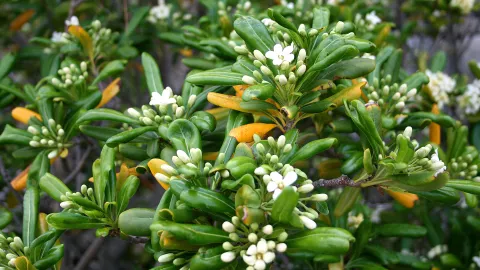
Scientific Name
Pittosporum tobira
Although the focus of this guide is on pruning, some gardeners shear their pittosporum. If a gardener chooses this method, then, just as for pruning, shearing should occur after the spring bloom. Shearing in the winter removes the flower buds.
Pittosporum are susceptible to a number of fungal diseases. Infected branches should be cut to at least six inches below the visible damage and the cuttings should be placed in the landfill, not in the green waste or in a compost bin.
When to Prune
After the spring bloom, but before July
Flowers/Fruit on New or Old Wood
Old Wood
How & What to Prune
Remove dead, diseased, or damaged wood.
Use thinning and releadering cuts to remove or shorten crossing branches. This especially appropriate for long branches that grow outside the canopy. They may be thinned to a lateral branch.
Use thinning and releadering cuts to open the plant or to reduce its height and width, as necessary.
If size control is an issue, consider removing approximately one-third of the tallest, oldest branches each year.

